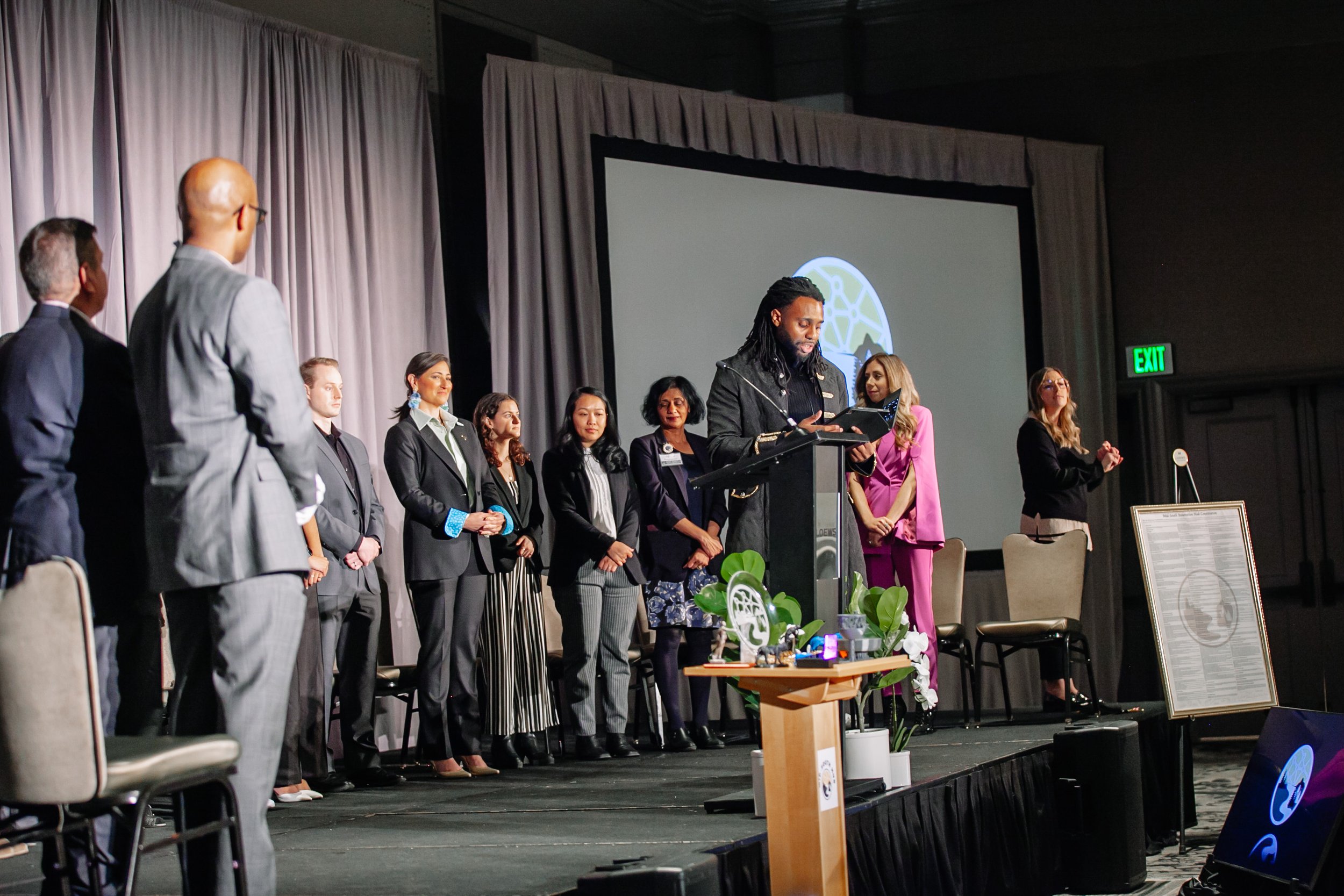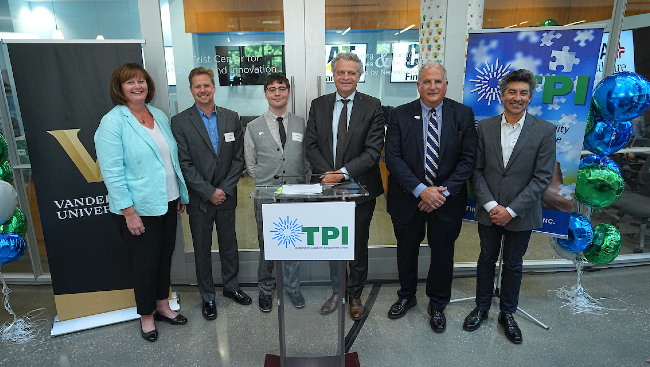

-
$36.1M
NSF Funding at Vanderbilt
FY 2023 -
27
Active NSF CAREER Awards
FY 2023 -
96
Current Graduate Research Fellows at Vanderbilt
Vanderbilt named NSF I-Corps Hub lead institution
Vanderbilt University has been chosen by the National Science Foundation to lead the new Mid-South Innovation Corps Hub, a group of nine universities that make up a regional coalition of diverse, tech-forward institutions to promote inclusive innovation, spur economic development and prosperity, and transform Midsouth metro areas into growth and commercialization centers for STEM-related technologies. As the lead institution for the Mid-South I-Corps Hub, Vanderbilt will receive up to $15 million from NSF over five years to fund participant microgrants, engage consultants with I-Corps experience, train I-Corps instructors, lead National I-Corps cohorts, publish materials resulting from hub work, and create positions to support programming and outputs.
The NSF I-Corps program prepares scientists and engineers to explore the potential of their ideas and research beyond the university. I-Corps accelerates the economic and societal benefits of deep technology research and innovation projects that are ready to move toward commercialization.
To date, the Vanderbilt I-Corps site has supported more than 700 teams of researchers and aspiring entrepreneurs in identifying product opportunities for their ideas; 64 percent of the teams have been led by underrepresented minority entrepreneurs. Since fall 2017, more than 34 teams of Vanderbilt students and faculty have been accepted into the National I-Corps program.
Teams have worked on ideas ranging from a 3D-printed hand orthosis for stroke victims, to a hemorrhage control device for use during trauma surgeries, and using the metaverse to combine immersive technology and a peer-based approach with cognitive behavioral therapy techniques.
Building the biomedical workforce: Coalition Responsible for Equitable Skills Training
The Urban League of Middle Tennessee, the Tennessee Coalition for Health Science and BioSTEM, and the Tennessee Board of Regents are teaming up with Vanderbilt University to create the Coalition Responsible for Equitable Skills Training. This project aims to develop an equitable model for workforce development that can be used across Tennessee and the Mid-South region. It will also help the United States compete globally, improve the economy and enhance national security.
Initially, CREST will focus on creating a skilled biotechnician workforce in Tennessee, offering a program called the CREST Biotechnician Bootcamp, which will train and certify community participants to become nationally certified biotechnicians in just 90 days. CREST will bring together businesses, communities and educational institutions to work together in training people for jobs in the field of biomedical science. The goal is to connect workers with the growing field of biomedical innovation in Tennessee and the Mid-South.
Recent CAREER Awards at Vanderbilt
NSF’s Faculty Early Career Development (CAREER) program offers the foundation’s most prestigious awards in support of early-career faculty who exemplify the role of teacher-scholars through outstanding research, excellent education, and the integration of education and research within the context of their organizations.
- An engineering professor will research how cells and biomaterials can work together to improve tissue regeneration for chronic inflammatory diseases.
- An associate professor of computer science will design online decision procedures for societal-scale cyber-physical systems.
- An assistant professor of chemistry will research protein structure and dynamics using two-dimensional infrared (2D IR) spectroscopy.
- An assistant professor of computer science will advance network analysis methods for data that contain both positive and negative interactions, like that found in e-commerce and online social media.
Vanderbilt Astronomers lead groundbreaking NSF-funded discovery
Astrophysicists found evidence for gravitational waves that oscillate with periods of years to decades using large radio telescopes to observe a collection of cosmic clocks in our galaxy. The gravitational-wave signal was observed in 15 years of data acquired by the North American Nanohertz Observatory for Gravitational Waves Physics Frontiers Center, a collaboration of more than 190 scientists from the U.S. and Canada who use pulsars to search for gravitational waves. A Vanderbilt assistant professor of physics and astronomy co-led the search and is the current chair of the collaboration.
This discovery is key evidence for gravitational waves at very low frequencies. These waves could arise from binary black holes—orbiting pairs of the most massive black holes in the universe that are billions of times more massive than our sun, with sizes larger than the distance between the Earth and the sun. Future studies of these signals will open a new window on the gravitational-wave universe, providing insight into titanic black holes merging in the hearts of distant galaxies, among other exotic sources.
Vanderbilt part of coalition to advance sustainable manufacturing and supply chain innovation
Vanderbilt University, along with other institutions across Tennessee and Kentucky, has received a $1 million award from the NSF’s Regional Innovation Engines program. The team’s proposal, led by a coalition named Generate Advanced Manufacturing Excellence for Change (GAME Change), aims to create economic, societal and technological opportunities in the Southeastern Commerce Corridor. The project focuses on improving manufacturing and supply chain logistics competitiveness across various sectors, including automotive, aerospace and energy.
The NSF Engines program was launched by NSF’s new Directorate for Technology, Innovation and Partnerships and was authorized by the CHIPS and Science Act of 2022. It represents a significant investment in research.
Managing online safety and privacy between parents and teens
Researchers at Vanderbilt developed a mobile app named “CO-oPS” to help resolve technology-related disputes between parents and teenagers. The app aims to enhance the safety and privacy of all family members by giving them transparency into each other’s online apps and permissions. The app enabled parents and teens to work collaboratively to safeguard their family from online dangers. The researchers found that working together can be mutually beneficial and build trust instead of animosity.
Early-life skills, attitudes and expectations in children
An assistant professor at Vanderbilt’s Peabody College has received a grant from the NSF for a project that aims to improve early parenting support programs for diverse and low-income families. The project will analyze data from in-home video footage from the New Jersey Families Study, a video-ethnographic study of 21 families from different social classes, races, ethnicities and family structures. The data will help researchers understand how parents support their children’s early development and improve programs designed to support parenting behaviors and practices in naturalistic contexts.
NSF SBIR/STTR funding at Vanderbilt
Four companies with ties to Vanderbilt are recipients of highly competitive Small Business Innovation Research/Small Business Technology Transfer grants from NSF. Those include:
- Couture Technologies – an innovative software company that empowers apparel brands to integrate virtual try-on technology.
- HeroWear LLC – designs back-assist exosuits to reduce strain on the back while fitting like a comfortable piece of clothing.
- SkyNano LLC – a science-based technology company that focuses on commercializing a free-market solution to carbon pollution.
- BlueWonder Creative Inc. – provides a content-driven mental health and wellness platform coupled with at-home activity boxes and hands-on services at partnered care centers, when fully deployed.
The SBIR/STTR program encourages small businesses to participate in federal research and development with the potential for commercialization. This program plays a vital role in the innovation ecosystem at Vanderbilt by supporting startups in the early stages of research and development.
The Wond’ry, Vanderbilt’s Innovation Center, and the Center for Technology Transfer and Commercialization at Vanderbilt University contributed to the startups’ growth in various capacities, from assisting with ideation and R&D to facilitating invention disclosures and commercialization services. Founders of these startups span Vanderbilt faculty, alumni, staff and students.
According to Launch Tennessee, companies awarded their SBIR/STTR matching funds have created more than 939 direct jobs and had an economic impact of $146,125,214 in Tennessee—a return of $11.24 for every public dollar invested into the program.

Graduate Research Fellowships
In FY 2023, 37 Vanderbilt graduate students and alumni won NSF Graduate Research Fellowships, bringing the total number of graduate student fellows at Vanderbilt to 96, the largest cohort VU has ever had. The fellowships provide three years of support and are aimed at aiding individuals who have demonstrated notable potential early in their research careers and at increasing the diversity of the science and engineering workforce.
Frist Center for Autism and Innovation
The Vanderbilt School of Engineering’s Frist Center for Autism and Innovation, inspired by neurodiversity, engineers technologies and transforms the workplace by bringing together engineers, business scholars, disabilities researchers, and experts in neuroscience and education to understand, maximize and promote neurodiverse talent. With NSF support, the Frist Center is:
- Working in partnership with Fisk University, with a $1.9 million NSF grant to create a system of programs to support neurodiverse students in engineering majors and careers.
- Using its unique strengths alongside the Vanderbilt Graduate School to train engineers and scientists engaged in advancing the future of work at the human-technology frontier. Supported by an NSF Research Traineeship grant, Vanderbilt’s Neurodiversity Inspired Science and Engineering program engages students across STEM disciplines in all stages of the development, deployment and commercialization that support neurodiverse individuals and/or that are inspired by their abilities.
- Collaborating on a $1 million Civic Innovation Challenge (CIVIC) Stage 2 Award from the NSF to improve equity for neurodiverse adults by completing and commercializing a novel virtual-reality driving instruction system that will help autistic adults have the independence they need to commute to and from work.
Research Experience for Undergraduates
The Research Experiences for Undergraduates program funds active research participation in various fields—including Nanoscale Science and Engineering, Chemical Biology, Physics and Astronomy, and Accountability, Behavior, and Conflict in Democratic Politics—at Vanderbilt University.
Improving equity in STEM education
Researchers in the College of Arts and Science and Peabody College received a grant from the NSF to study how to improve equity in large, introductory college STEM courses. They will investigate the impact of learning assistants programs on women, racially and ethnically marginalized groups, and first-generation students.
Training diverse students in STEM
Vanderbilt University is committed to increasing the number of underrepresented minority students completing STEM degrees. Partnered with historically Black colleges and universities and funded by NSF, Vanderbilt is working to improve the demographic representation in STEM fields.
Vanderbilt University is a partner in the Tennessee Louis Stokes Alliance for Minority Participation program, an NSF-funded coalition of six colleges and universities in the state of Tennessee that aims to improve the academic success and retention of historically underrepresented minority students in STEM fields statewide, as well as to promote graduate education in STEM.
The Fisk-Vanderbilt Master’s-to-Ph.D. Bridge Program provides students a stepping stone from their master’s degree at Fisk University to a Ph.D. at Vanderbilt. After 19 years, 181 students have enrolled in the program, 147 master’s degrees have been awarded, and 128 students have bridged to Ph.D. programs. Today, 21 students are in a Vanderbilt Ph.D. program, while 21 are in a Fisk master’s program; 50% of the students are African-American, 22% Hispanic, 7% other minorities, including Native Hawaiian and Pacific Islander, and 18% white or other non-minority; 58% identify as female. Moreover, our students represent many marginalized and underserved populations, such as first-generation, low-income, physically and learning disabled, and sexual and gender minorities.
Overwhelmingly, the student population has been underserved in intersecting ways, with many being first-generation college students, of low socioeconomic status, and/or with disabilities. For African American students in the program, the 10-year STEM Ph.D. completion rate is nearly twice the national average.
For more information, please contact the Vanderbilt Office of Federal Relations:
Christina West 202-216-4370 | Heather Bloemhard 202-216-4368
federalrelations@vanderbilt.edu
FY 2023